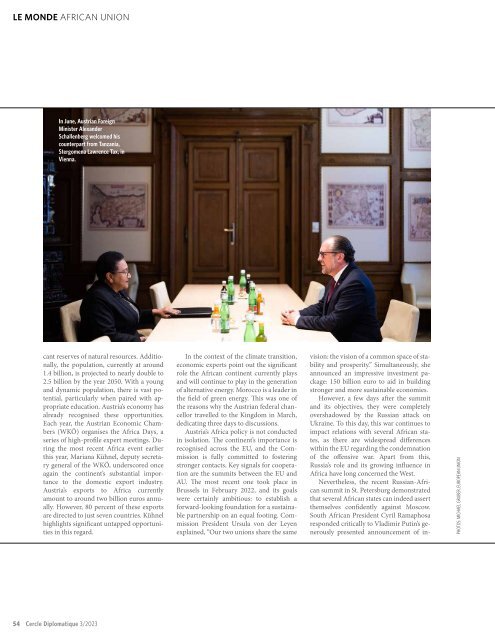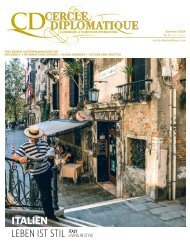CERCLE DIPLOMATIQUE - issue 03/2023
CD is an independent and impartial magazine and is the medium of communication between foreign representatives of international and UN-organisations based in Vienna and the Austrian political classes, business, culture and tourism. CD features up-to-date information about and for the diplomatic corps, international organisations, society, politics, business, tourism, fashion and culture. Furthermore CD introduces the new ambassadors in Austria and informs about designations, awards and top-events. Interviews with leading personalities, country reports from all over the world and the presentation of Austria as a host country complement the wide range oft he magazine.
CD is an independent and impartial magazine and is the medium of communication between foreign representatives of international and UN-organisations based in Vienna and the Austrian political classes, business, culture and tourism. CD features up-to-date information about and for the diplomatic corps, international organisations, society, politics, business, tourism, fashion and culture. Furthermore CD introduces the new ambassadors in Austria and informs about designations, awards and top-events. Interviews with leading personalities, country reports from all over the world and the presentation of Austria as a host country complement the wide range oft he magazine.
Create successful ePaper yourself
Turn your PDF publications into a flip-book with our unique Google optimized e-Paper software.
LE MONDE AFRICAN UNION<br />
In June, Austrian Foreign<br />
Minister Alexander<br />
Schallenberg welcomed his<br />
counterpart from Tanzania,<br />
Stergomena Lawrence Tax, in<br />
Vienna.<br />
tending to provide grain to six African<br />
countries: “We want the Black Sea to be<br />
open to the world market; we did not come<br />
here to ask for donations.”<br />
Undoubtedly, the African continent has<br />
become a significant power factor in global<br />
politics. This is also due to the fact that the<br />
association of African countries, the African<br />
Union (AU), has evolved into a notable<br />
voice for the continent. The predecessor of<br />
the AU was the “Organization of African<br />
Unity” (OAU), founded on 25 May 1963.<br />
Its main task at that time was to support the<br />
remaining colonies in their process of gaining<br />
independence, unify the continent<br />
and contribute to peacefully resolving the<br />
numerous interstate conflicts. Kwame<br />
Nkrumah, the former president of Ghana,<br />
urged at the founding summit, “We must<br />
unite now — or perish!”<br />
Given the multitude of diverse cultures,<br />
languages and political interests, the years<br />
that followed were not easy. In the West,<br />
“Our two unions share the same vision:<br />
the vision of a common space of stability<br />
and prosperity.”<br />
Ursula von der Leyen<br />
criticism often emerged that the OAU was<br />
a debating club lacking enforcement power<br />
and that many members were far from democratic.<br />
Additionally, a fundamental <strong>issue</strong><br />
arose, one that we also recognise in<br />
Europe: few states were willing to cede<br />
more sovereignty than absolutely necessary<br />
to the OAU.<br />
In 2002, the AU was finally established<br />
as a successor organisation with expanded<br />
competencies. The EU served as a model.<br />
Today, the AU has 55 members. Additionally,<br />
a free trade zone has been created,<br />
with nearly all states participating. Internationally,<br />
the AU presents itself more confidently<br />
than before. It aspires to a permanent<br />
seat on the UN Security Council as<br />
Africa’s voice and aims to become a member<br />
of the G-20 group of nations. This has<br />
garnered clear support from Europe.<br />
The AU even has its own organ for<br />
peacekeeping, the Peace and Security<br />
Council. However, the recent coup in Niger<br />
cant reserves of natural resources. Additionally,<br />
the population, currently at around<br />
1.4 billion, is projected to nearly double to<br />
2.5 billion by the year 2050. With a young<br />
and dynamic population, there is vast potential,<br />
particularly when paired with appropriate<br />
education. Austria’s economy has<br />
already recognised these opportunities.<br />
Each year, the Austrian Economic Chambers<br />
(WKÖ) organises the Africa Days, a<br />
series of high-profile expert meetings. During<br />
the most recent Africa event earlier<br />
this year, Mariana Kühnel, deputy secretary<br />
general of the WKÖ, underscored once<br />
again the continent’s substantial importance<br />
to the domestic export industry.<br />
Austria’s exports to Africa currently<br />
amount to around two billion euros annually.<br />
However, 80 percent of these exports<br />
are directed to just seven countries. Kühnel<br />
highlights significant untapped opportunities<br />
in this regard.<br />
In the context of the climate transition,<br />
economic experts point out the significant<br />
role the African continent currently plays<br />
and will continue to play in the generation<br />
of alternative energy. Morocco is a leader in<br />
the field of green energy. This was one of<br />
the reasons why the Austrian federal chancellor<br />
travelled to the Kingdom in March,<br />
dedicating three days to discussions.<br />
Austria’s Africa policy is not conducted<br />
in isolation. The continent’s importance is<br />
recognised across the EU, and the Commission<br />
is fully committed to fostering<br />
stronger contacts. Key signals for cooperation<br />
are the summits between the EU and<br />
AU. The most recent one took place in<br />
Brussels in February 2022, and its goals<br />
were certainly ambitious: to establish a<br />
forward-looking foundation for a sustainable<br />
partnership on an equal footing. Commission<br />
President Ursula von der Leyen<br />
explained, “Our two unions share the same<br />
vision: the vision of a common space of stability<br />
and prosperity.” Simultaneously, she<br />
announced an impressive investment package:<br />
150 billion euro to aid in building<br />
stronger and more sustainable economies.<br />
However, a few days after the summit<br />
and its objectives, they were completely<br />
overshadowed by the Russian attack on<br />
Ukraine. To this day, this war continues to<br />
impact relations with several African states,<br />
as there are widespread differences<br />
within the EU regarding the condemnation<br />
of the offensive war. Apart from this,<br />
Russia’s role and its growing influence in<br />
Africa have long concerned the West.<br />
Nevertheless, the recent Russian-African<br />
summit in St. Petersburg demonstrated<br />
that several African states can indeed assert<br />
themselves confidently against Moscow.<br />
South African President Cyril Ramaphosa<br />
responded critically to Vladimir Putin’s generously<br />
presented announcement of in-<br />
PHOTOS: MICHAEL GRUBER, EUROPEAN UNION<br />
SPARKLING<br />
MOMENTS<br />
Spend sparkling moments with your loved<br />
ones at our exclusive Afternoon Tea or<br />
our legendary Champagne Brunch every<br />
Sunday at 12:00.<br />
+43 1 236 1000<br />
RESTAURANTS.VIENNA@KEMPINSKI.COM<br />
KEMPINSKI.COM/VIENNA<br />
54 Cercle Diplomatique 3/<strong>2023</strong><br />
Cercle Diplomatique 3/<strong>2023</strong><br />
55
















